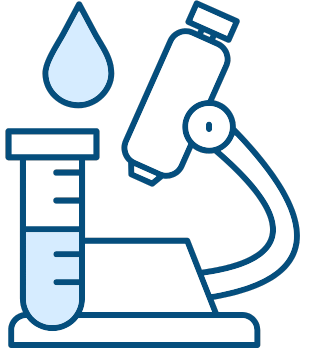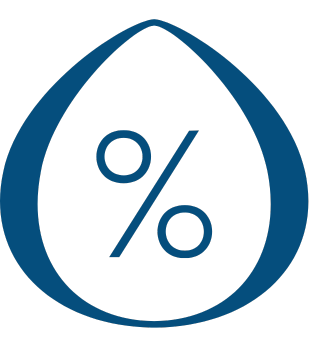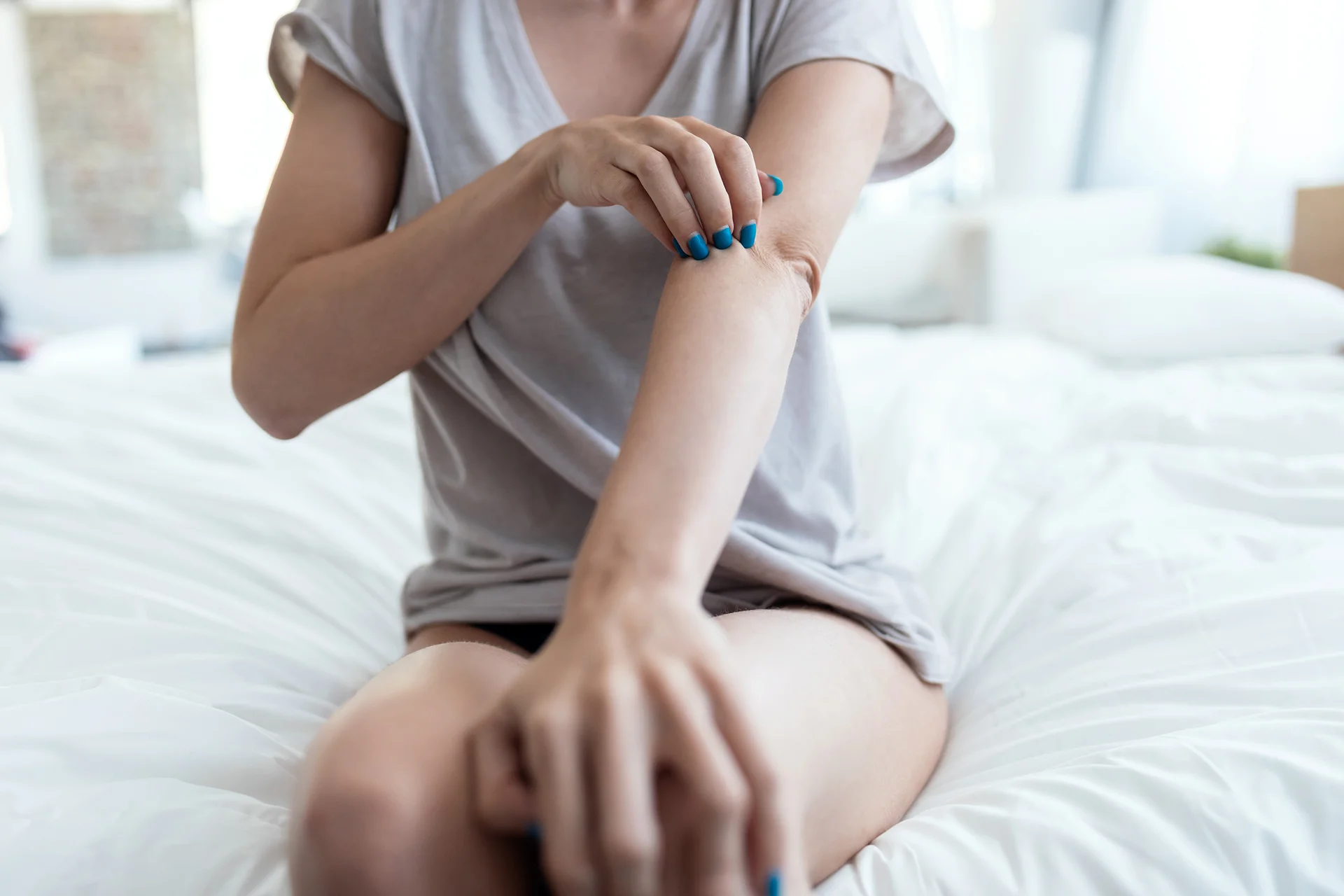If your skin is dry, red and itchy, you may be affected by eczema. Although skin eczema is often thought of as a disease of babies and children, eczema is in fact one of the most common skin diseases, affecting around one third of the world’s population. Eczema can take many forms and be caused by different factors such as allergies, irritation or genetics. Eczema can occur on any part of the body and in individuals of any age. It is not a dangerous or contagious disease, but it can seriously impair quality of life and even cause psychological problems.
In this article, together with Drops Clinic’s specialist doctors, we will look at this puzzling skin disease, learn more about the causes and symptoms of eczema and look at how we can cure eczema.
Our servicesExzema – what is it?
Eczema is a skin disease. Often referred to as atopic dermatitis, skin eczema is a superficial chronic or acute inflammation of the skin, characterised by rashes such as nodules, vesicles, urination, scabs, and scaling. Skin affected by eczema becomes red, cracked and itchy. Eczema is caused by a variety of reasons, such as external or internal irritants or a compromised immune system.
Eczema is said to affect only young children and babies. And although the disease is more common in children and the first symptoms often appear in the first months of life, it does not affect adults. Eczema is one of the most common skin diseases, affecting perhaps a third of the population.
Eczema is one of the atopic diseases. These diseases are accompanied by asthma and hay fever. Therefore, people with eczema often have, or are predisposed to, other atopic diseases.
How to recognise eczema?
Eczema symptoms can occur anywhere on the body. Eczema most commonly affects the skin on the hands, feet, face, neck or body folds. In babies and young children, eczema usually appears on the cheeks, forehead or scalp.
Eczema is characterised by itching and various skin lesions such as redness, scaling, blisters, rashes, scabs and changes in pigmentation. These symptoms can be mild or severe and change over time. Some people experience only minor skin problems, while others experience severe pain or general malaise. Certain factors can make eczema symptoms worse – dry skin, heat, sweat, stress or allergens.
Symptoms of eczema
Symptoms of eczema can vary depending on the type of eczema and the area of skin affected, but there are some common signs that can help you recognise eczema:
- Dry, cracked skin, flaking. Diseased skin loses moisture and elasticity and becomes more sensitive.
- Itching. This is the main symptom of the disease. Eczema can also cause itching, which can sometimes be very intense, interfere with sleep or cause stress.
- Redness and swelling on the skin. Most often caused by increased blood flow in small capillaries, inflammation caused by eczema.
- Nodules, blisters, sores or scabs on the skin. These are a reaction of the skin to inflammation or infection.
- Urination, watery blisters. Does not always occur as the disease progresses. These symptoms can increase the risk of infection and increase itching.
- Skin thickening, scratches. Most often caused by digging, as digging damages and injures the skin.
- Changes in pigmentation. Changes in skin colour can occur both as a result of inflammation and treatment. The skin may darken or lighten.
Types of exzema:
Eczema is an umbrella term for several skin diseases of the same type, which are manifested by itchy and inflamed skin lesions. The types of eczema may differ in terms of the causes, symptoms, their intensity and the methods of treatment.
The most common types of eczema are atopic dermatitis, contact eczema, seborrhoeic eczema and dyshidrotic eczema. Each has its own characteristics and requires an individual approach to treatment.
Atopic dermatitis
Atopic dermatitis, also known as true eczema, is a chronic skin disease that usually starts in childhood. It is most often associated with an allergic reaction to certain allergens or environmental factors such as dust mites, animal hair, pollen or food.
Atopic eczematous dermatitis is characterised by dry, itchy and red skin on the hands, feet, face or neck. Sometimes blisters or scabs appear, which may become wet and infected. Treatment for atopic eczema includes moisturising creams and allergy medications such as antihistamines and corticosteroids, which reduce inflammation and itching.
Contact eczema
Contact eczema is an inflammation of the skin caused by direct contact with an irritant. Contact eczema can be allergic or irritative. Allergic contact eczema is caused by an immune response to an allergen. Irritant contact eczema results from severe or prolonged irritation. It can be affected by various chemicals, cleaning products, soaps, shower detergents, foams, glues.
Contact eczema is characterised by itching, redness and blistering on the affected area. To treat contact eczema, avoid the irritant and use ointments or creams that soothe and heal the skin.
Seborrhoeic eczema
Seborrhoeic eczema is a skin disease that affects areas of the skin where sebaceous glands are abundant. Seborrhoeic eczema can be caused by increased sebum production, hormonal changes or the growth of certain fungi. These fungi feed on sebum and cause inflammation and scaling.
Seborrhoeic eczema is characterised by scaly, red and itchy skin. It usually appears on the scalp, face, chest or back. Treatment of seborrhoeic eczema includes shampoos, ointments and cleansers containing antifungal or keratolytic components.
Dishidrotic eczema
Dyshidrotic eczema is a skin disease that mostly affects the hands and feet. This type of eczema is associated with sweating and stress. Dishidrotic eczema of the hands and feet presents with acute symptoms of small watery blisters on the palms of the hands and soles. The blisters can be painful and itchy and may burst or dry out. This type of eczema is most common in adults under 50. Treatments for dyshidrotic eczema include compresses, ointments with corticosteroids or calcine inhibitors
What causes eczema?
There is still no definitive and unambiguous answer in medicine to the question – what causes eczema? However, there is a general consensus that eczema cannot be caused by a single specific factor. Rather, the disease is caused by a combination of factors, even seemingly unrelated ones.
The main culprit is thought to be the body’s exhausted immune system, which allows inflammation and infections to take hold. Weakening of the nervous system due to constant stress and tension is also a major contributing factor.
The causes of eczema can vary depending on the type of eczema. However, in general terms, there are several factors that contribute to the development of eczema:
- Genetic features. People with eczema often inherit a predisposition to various allergies and a weak skin barrier.
- Disruption or weakening of the body’s immune system. The immune system of people with atopic dermatitis overreacts to harmless allergens and tries to fight various external stimuli, causing an inflammatory reaction in the skin.
- External stimuli. Contact eczema usually occurs when the skin reacts to certain substances (cosmetics, certain fabrics or chemicals). Contact with these substances can cause skin irritation or an allergic reaction.
- Immune system disorder. A weakened immune system allows inflammation and infections to develop in the body.
- Stress. Stress can affect the immune system and increase inflammation in the body, and can also promote itching.
- Hormonal changes. Changes in hormones, such as during pregnancy or menopause, can affect the condition of the skin and the appearance of eczema.
- Infections. Various infections, such as bacterial or fungal infections, can damage the skin barrier and lead to exacerbations of eczema.
How to treat eczema?
The treatment of eczema depends a lot on the type of eczema you have, the causes of the eczema, the symptoms, and the area of skin affected. However, in general, eczema is usually treated in the following ways:
- Avoiding allergens and irritants. One of the most important treatments for contact eczema, but also important for other types of eczema. It is important to avoid or completely eliminate allergens and irritants that can cause or aggravate skin eczema: certain foods, chemicals, cosmetics, fabrics, plants, dust, pollen, etc.
- Skin care and moisturisation. Dry skin is one of the main causes of eczema and one of the factors that worsen symptoms. It is therefore important to use moisturising and emollient skin care products to help restore the skin barrier and reduce dryness, flaking and itching. Moisturisers should be free of fragrances, dyes or alcohol. It is particularly important to moisturise the skin after showering or washing hands. To avoid further drying of the skin, rinse with lukewarm water rather than hot water. When bathing, you can add a small amount of oatmeal to the water to reduce inflammation and itching.
- Antihistamines. Itching is a major symptom of eczema and can interfere with sleep and cause stress. Antihistamines help to reduce itching and allergic reactions. Some antihistamines can be bought over the counter, but should only be taken as prescribed by your doctor..
- Anti-inflammatory drugs. Anti-inflammatory drugs suppress the inflammation caused by eczema. Anti-inflammatory drugs can be applied directly to the affected area of the skin, administered intravenously, or taken in tablet form. Such medicines are available on prescription only and should only be used as prescribed by a doctor.
- Nutrition. Diet can affect the symptoms and course of eczema. Some people have allergies or intolerances to certain foods such as milk, eggs, wheat or nuts. In this case, these foods should be avoided and a hypoallergenic diet should be followed. It is also important to eat a healthy and balanced diet.
- Light therapy. Light therapy helps to manage eczema, improve the overall condition of the skin and promote skin regeneration. The light used for therapy is similar to part of the electromagnetic spectrum naturally emitted by the sun, but it does not contain harmful UV rays and is therefore completely safe. In most cases, more than one light therapy session is required.
- Intravenous therapy. Drip therapy hydrates the body and helps prevent dehydration, which can lead to dry skin. The therapy uses vitamins and beneficial substances to strengthen the immune system and help it fight inflammation. Droplet therapy will help prevent unpleasant sensations and improve the overall condition of the skin.
What can I do to prevent eczema?
Although it is not entirely clear what causes skin eczema, prevention of eczema is possible and is crucial to prevent the disease from recurring or worsening. The main ways you can use to prevent eczema or reduce its symptoms are:
- Identify and avoid allergens or irritants that can cause or aggravate eczema. These can include certain foods, chemicals, cosmetics, fabrics, plants, dust, pollen, etc. If you don’t know what you are allergic to, you can have specific tests to detect allergies.
- Use moisturising and emollient skin care products to help restore the skin barrier and reduce dryness, flaking and itching. It is important to moisturise your skin daily and often, especially after bathing or showering. You can find skin moisturisers in any pharmacy or cosmetic shop, but it is important to pay attention to the composition of the product to avoid additional irritants.
- Maintain good hygiene and bathe in warm water with a mild washcloth without fragrances or dyes. Avoid using hot or cold water as this can only increase dryness and irritation.
- Wear natural fabrics (cotton, wool) that allow the skin to breathe and do not cause irritation. Avoid synthetic fabrics which can cause sweating and allergies.
- Eat a healthy and balanced diet, avoiding foods that can cause allergies or inflammation. Instead, choose foods that are anti-inflammatory and anti-allergic (oily fish, broccoli, blueberries, cherries).
- Drink plenty of fluids and avoid alcoholic or caffeinated beverages, as these can dehydrate the body and increase dryness of the skin.
- Manage stress and find ways to reduce it, e.g. meditation, breathing exercises, exercise.
- Seek medical advice and follow your doctor’s instructions for taking medicines or other treatments.
Is eczema contagious?
In principle, cutaneous eczema is not a contagious disease and cannot be transmitted by contact with the affected person. However, if the skin is damaged or irritated, eczema can be infected with bacteria or fungi and spread to other parts of the body or to other people through contact. In this case, the infection should be treated with antibiotics or antifungal drugs. The infection can cause redness, swelling, pain, urination or suppuration of the skin. If you notice signs of infection, it is important to follow the hygiene rules and seek medical advice.
Eczema is an uncomfortable and embarrassing but common skin disease that can be controlled and treated. If you suffer from eczema, it is important to avoid skin irritants and use moisturising creams. If you develop signs of eczema, contact the specialist doctors at Drops Clinic. They will take care of your health, help you get rid of the symptoms quickly and improve your quality of life.
register



